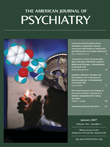Manic Episode During Treatment With Aripiprazole
To the Editor: Atypical antipsychotics are being increasingly used for the treatment of bipolar disorder. Olanzapine, risperidone, quetiapine, ziprasidone, and aripiprazole received Food and Drug Administration approval for the management of this disorder. We report a case of possible induction of mania with the use of aripiprazole.
A 45-year-old Caucasian woman with a diagnosis of schizoaffective disorder-bipolar type reported stable mood with minimal mood swings while receiving divalproate sodium 1500 mg at bedtime and fluphenazine hydrochloride 5 mg in the morning and 10 mg at bedtime. She complained of grinding teeth at night, being excessively sleepy, and having increased appetite and weight gain. After discussing the potential risks and benefits, a decision was made to add aripiprazole to the current regimen, with a future plan of decreasing fluphenazine.
Aripiprazole was started at 10 mg a day. The patient complained of changes in mood from the third day of starting aripiprazole. She reported decreased need for sleep, racing thoughts, euphoric mood, and grandiose delusions about being a royalty. She was noted to be laughing inappropriately and singing loudly. She scored 31 on the Young Mania Rating Scale (1) . She denied abusing alcohol or drugs in the interim. Aripiprazole was discontinued, and she was enrolled in a partial hospital program. Her manic symptoms reduced in intensity within a few days and resolved completely within 2 weeks after discontinuation of aripiprazole. She scored 6 on the Young Mania Rating Scale at 2 weeks.
The temporal relationship of the manic symptoms to the initiation of aripiprazole and their resolution with discontinuation of this medication supports the assumption that the manic episode was induced by aripiprazole. Seven out of the eight criteria proposed by Aubry et al. for a switch into mania secondary to atypical antipsychotics were met, suggesting that aripiprazole was the proximate cause of this patient’s manic symptoms (2) .
Several possible mechanisms have been proposed for the induction of mania by atypical antipsychotics, including a high ratio of 5-HT 2 /D 2 receptor occupancy with risperidone and olanzapine, and monoamine reuptake inhibition antidepressant-like effect of ziprasidone (3) . Aripiprazole is a partial agonist at 5-HT 1A and partial antagonist at 5-HT 2A receptors (4) . It is a partial agonist at dopaminergic receptors with high affinity for D 2 and D 3 receptors and moderate affinity for D 4 receptors (4) . Combined effect of antagonistic activity at 5-HT 2A and partial agonistic activity at D 2 receptors, along with agonistic activity at 5-HT 1A receptors, may cause frontal dopamine release contributing to manic symptoms. In addition, the prolonged use of fluphenazine could have resulted in a functional hypodopaminergic state and upregulation of the postsynaptic D 2 receptors, of which stimulation by aripiprazole could result in exacerbation of the manic symptoms.
Although this case report adds to the literature on atypical results of atypical antipsychotics, caution needs to be used while interpreting the results, since aripiprazole is approved for the treatment of acute mania. Possible differences in response to aripiprazole in patients with bipolar affective disorder versus those with schizoaffective disorder need to be investigated. Furthermore, a drug screen was not performed to assure the patient’s denial of substance abuse.
1. Young RC, Biggs JT, Ziegler VE, Meyer DA: A rating scale for mania: reliability, validity and sensitivity. Br J Psychiatry 1978; 133:429–435Google Scholar
2. Aubry JM, Simon AE, Bertschy G: Possible induction of mania and hypomania by olanzapine or risperidone: a critical review of reported cases. J Clin Psychiatry 2000; 61:649–655Google Scholar
3. Nolan BP, Schulte JJ, Jr: Mania associated with initiation of ziprasidone. J Clin Psychiatry 2003; 64:336Google Scholar
4. DeLeon A, Patel NC, Crismon ML: Aripiprazole: a comprehensive review of its pharmacology, clinical efficacy, and tolerability. Clin Ther 2004; 26:649–666Google Scholar



